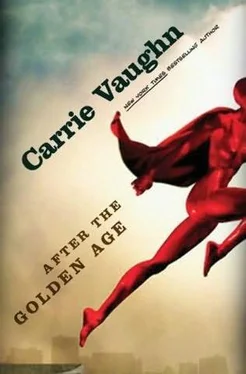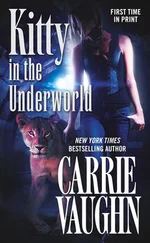The news channels had finally gotten cameras to the harbor area, though the police forced them to keep a wide berth. Pierson Street was completely flooded, as if a tidal wave had crashed in and scoured the place. No one had been killed outright, but two police officers were missing, and feared swept out to the harbor. Typhoon had disappeared during the confusion, and one officer reported seeing the Bullet—briefly.
Reports were mixed as to whether the police had fired at Typhoon before or after she released the tidal wave.
All Celia, Suzanne, and Arthur could do for the moment was watch the jerky, static-laden images from the news cameras, listen to the sensationalist commentary—talk of the superhumans gone rogue, of a new criminal mastermind taking over—and listen for the latest reports on the police radio.
Then Captain Olympus buzzed the Olympiad’s emergency line. The flashing red light made them all flinch; Spark pounded the button to reply.
“Yes, Captain, we’re here,” she said to the speaker.
“We’re coming up from the garage. We have injured.” He cut off the line.
Without comment, Spark ran to the back of the room and the elevator that led straight to the subterranean passage, where the Olympiad gained access to its hangar and vehicles. Arthur, more calmly, went to a supply locker hidden behind a secret panel that lay flush with the slick wall and removed a first-aid kit.
Celia waited by the table. She’d only get in the way if she tried to help. The injury couldn’t be serious—a graze, a twisted arm. There was only so much they could do with a first-aid kit. She liked to think if the injury were serious, her father would swallow his pride and go to the hospital. Take Robbie to the hospital—no way was Warren the injured party.
The elevator door hissed open. Captain Olympus exited first, assisting someone, a woman, her arm over his shoulder. Spark went to her other side to help, bringing her into the light. It was Typhoon, her blue suit damp and shining with water—and blood. The Bullet followed them to the table.
Typhoon was walking under her own power. She just seemed weak. Her taut jaw made her face, or what was visible of it, a picture of grim forbearance.
Stunned, Celia pulled a chair out from the table and offered it to her.
She’d keep her mouth shut. Until Analise said something, she’d keep her mouth entirely shut. She stepped out of the way as her parents helped the young woman into the chair. Then, the bloody gash in her shoulder became visible. It had been bound with a strip of cloth. The wound had mostly clotted, but rivers of blood streaked Typhoon’s arm. Not life-threatening, but the shock and blood loss were probably telling on her. She kept shaking her head.
Celia caught Arthur’s gaze. Don’t tell, she thought at him. Don’t tell them who she is.
He nodded.
“A shot grazed her,” Olympus said. “I thought it best to get her to safety.”
“I feel so stupid,” Typhoon muttered. “They started shooting at me and I just lost it. I never lose it like that when the bad guys are shooting.”
Spark said, “It’s because you know you’re better than the bad guys. The police confused you; they’re supposed to be good guys.”
“They still are,” Arthur said. He knelt by her and got to work, peeling off the makeshift bandage and dabbing at the wound with a gauze pad. “They believe they’re following orders and protecting the city, just as we are. Best not forget that. We’re all being played, I fear.”
“By the Destructor?” Typhoon said. “It’s his style.”
“That remains to be seen.”
“You didn’t have to do this. I’d have made it out on my own.” She tried standing, as if she really were well enough to walk out of there.
Olympus put his hand on her shoulder and held her in place. No one could argue with that grip, and Typhoon didn’t have a body of water nearby to help her. “You’re staying.”
“I’m not taking my mask off.”
“No one told you to,” Olympus said.
Typhoon … Analise—Celia was getting confused—caught her eye and glared briefly. Keep quiet.
So be it.
Celia leaned against the table and watched the news broadcasts. The police had issued a warrant for Typhoon’s arrest. The bulletin warned the public that she was dangerous. Not armed and dangerous, Celia noticed.
On one station, helicopters panned searchlights over Pierson Street. Rivers of water ran along gutters to pour back into the harbor. That wave must have been incredible, a wall of water as tall as the buildings sweeping down the street. Red and blue police lights flashed off glistening brick and concrete. Dozens of cops scouted the area; out on the water, divers searched from a police boat. They wouldn’t stop until they’d found the two missing officers. Their condition would determine which way this whole business swung.
She turned off the mute key on another monitor, showing a different news station. A woman anchor intoned, “… have word that another of the city’s superhuman vigilantes has broken the mayor’s curfew. This is an exclusive report. Gina, what do you have for us?”
The scene switched to the jerky video from a news helicopter—and why the hell weren’t the reporters being hauled in for breaking curfew?—and the rough sound feed filled with background noise.
“Thank you, Paula. Reports say that Breezeway has been sighted in the lower downtown area. A police helicopter has been dispatched. Now, we’ve been ordered to stay out of the area, but our cameraman thinks we have a good chance of spotting something if we— Hold on. Wait a minute. Yes, there. Can you see that?”
The view zoomed abruptly as the cameraman brought a distant point into focus. The shot was wobbly, vertiginous, but the tableau became visible. A speck, which resolved into a human figure, streaked across the view, flying thirty feet above the tenement rooftops. The camera sped along to keep up with it. Two helicopters approached from opposite directions, apparently hoping to cut off Breezeway’s path. They should have known better than to try something like that. Breezeway was setting them up for a spectacular, cinematic head-on collision designed to make them look like idiots.
Reporter Gina continued. “You probably can’t hear it, but the police in one of the helicopters are calling over a loudspeaker for Breezeway to turn himself in to avoid charges of resisting arrest.”
Gina was right, her microphone didn’t pick up the loudspeaker, but Breezeway’s form shot ahead, speeding up, a response that would surprise no one. The two police helicopters swung around to follow, one of them climbing in altitude, the other one dropping, as if they could sandwich him between them.
Celia never thought she’d be rooting for Breezeway.
The camera managed to continue tracking the flier. The superhuman had veered left, apparently heading toward the uptown district where he could lose himself among skyscrapers, where the helicopters wouldn’t be able to follow. She wondered: If she went to the roof, could she flag him down and offer him a place to hide out? West Plaza, home to fugitive vigilantes.
Then, the unexpected. A third police helicopter shot up from a hidden place behind a warehouse, in front of Breezeway, cutting him off. He pulled up, arcing away to avoid the new threat.
But they were ready for him. Something launched from the police helicopter, and suddenly Breezeway was dropping. Even Gina the reporter gasped in shock.
Breezeway didn’t keep falling, however. He stopped short, dangling some twenty feet under the helicopter.
“Paula, can we have a replay on that? What just happened?”
Back at the studio, the technicians worked their magic, magnified the image, enhanced it, and replayed it.
Читать дальше












